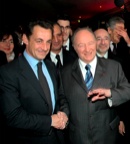His age and experience do not diminish the vigor of his statements. Roger Cukierman holds his audience in suspense as he tells in detail how, from the Elysée to Matignon, via the CSA, he managed to mobilize the highest authorities of the French Republic to ban the broadcast of “Al Manar,” the Lebanese Hezbollah television channel, in France. Despite the seriousness of the various subjects addressed during his lecture and book signing, the former president of the Edmond de Rothschild Group maintains a good dose of humor. Naturally Jewish. At the end of his presentation, an audience member engages him and lists several commendable actions he carried out when he was head of the Representative Council of Jewish Institutions of France. He wryly remarks, “I regret that my mother-in-law cannot hear you!”
Having come to Nice to sign his book, the author knew the Baie des Anges under much more dramatic circumstances: a hasty departure in 1943 from the apartment at “125 rue de France” to escape Nazi roundups and a refuge found with the nuns of Dom Bosco, where he remained hidden for a year. The title of his book, “Neither Proud, Nor Dominant,” is intended as a response to General de Gaulle’s famous 1967 statement, which he views as an “incredible amalgam between Jewish and Israeli people,” though it did not prevent a shift in French diplomacy in favor of the Arab world.
Re-elected to head the CRIF for a second three-year term in 2004 with over 80% of the votes, Roger Cukierman is not someone afraid of his own shadow. His history, tragic like many of those who saw their families disappear in extermination camps, likely gives him the taste and temperament to fight. His determined fight against anti-Semitism in France is not just circumstantial and not a means to gain some political favor. Far from being a narcissistic memoir, his book offers testimony of systematic action and serves as a guide to maintaining vigilance, underlining that his successors should never lower their guard. Thus, when he leads an active campaign in 2000 amid rising anti-Semitic acts to draw the attention of political leaders, he disrupts both protocols and officials, both left and right. This led to a stern call from Jacques Chirac, which introduces his story.
Although he admires the current President of the Republic for his willingness to break away from tradition, he nevertheless expresses concerns about developments leading, in his view, to “France becoming increasingly community-oriented like the American model.” In his book, he also notes that unlike his successor, he would not have “dared” to invite the occupant of the Elysée to CRIF’s annual dinner. He admits disappointment with Nicolas Sarkozy in foreign policy, specifying that the head of state, in his opinion, made a strategic mistake by granting respectability to dictators like Bashar Al-Assad. Regardless of the fact that Israelis are currently negotiating with that same dictator, he asserts: “I don’t see what this brings” to these negotiations. He adds: “He is so eager to influence events that he might even go to Ahmadinejad!”
While Roger Cukierman expresses support for a peace agreement on the Golan, he remains pessimistic about regional developments: “Hezbollah has taken over Lebanon, where Christians are disappearing in favor of increasingly powerful Shiites,” he insists. As for the possibilities of decoupling Damascus from Tehran, he regrets that France has granted respectability “without anything in return.” “Today,” explains Roger Cukierman, “Nicolas Sarkozy has nothing left to offer to Syria.” While he supports Tzipi Livni’s candidacy for prime minister, the new domestic political situation in Israel does not change his view on the Iranian threat: “I cannot imagine a responsible prime minister allowing Iranians to acquire a nuclear bomb.” “And whatever the consequences may be,” he concludes, “the Israeli people will remain united.”


